- Get link
- X
- Other Apps
- Get link
- X
- Other Apps

All 20 Premier League captains, including Liverpool's
Jordan Henderson, wore rainbow armbands at the weekend
PT KONTAK PERKASA FUTURES - Rainbows were more than just
visible in sport last week - they were front and centre, helping to
make sport everyone's game in an unprecedented show of support.
The focus was on professional football and rugby union, but
quite rightly for a campaign celebrating inclusion, people from all
different sports and walks of life joined in. Bristol Flyers Basketball,
MPs such as Caroline Lucas, and Strictly dance 'sensation' Ed Balls
were just a few of those showing off their Rainbow Laces on Twitter.
The
government estimates that 5-7% of the UK population identifies as
lesbian, gay, bisexual or transgender, and for reasons discussed at
length in parliament committee inquiries, by academics, in surveys and
in conferences, many LGBT people have felt and continue to feel excluded
from sport. Now sport has collectively welcomed those people in - and a
significant step has been taken in the fight against homophobia,
biphobia and transphobia.
Here's five things we learned from Rainbow Laces weekend...
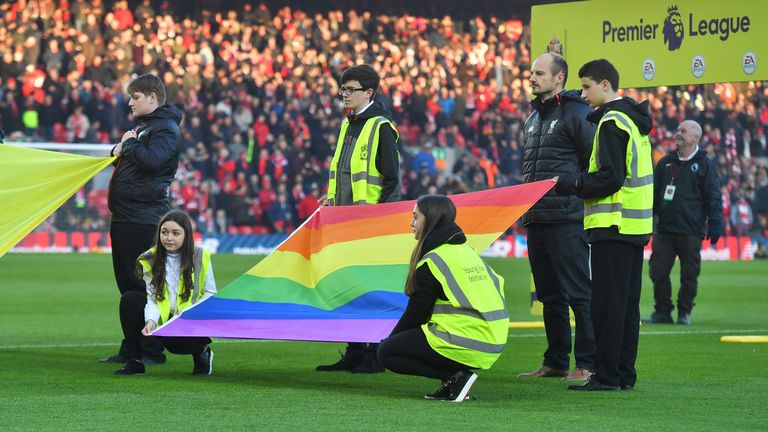
Rainbow flags were part of the pre-match build-up at the weekend's 10 Premier League fixture
Strong messages from the top filter down faster
"The
LGBT community is a vital part of our community," wrote Premier League
chairman Richard Scudamore. "We will support our clubs in ensuring the
important campaign messages are heard," added EFL chairman Shaun Harvey.
The RFU's chief executive Ian Ritchie concurred: "We believe rugby's
core values of respect, teamwork and sportsmanship resonate with what is
at the heart of this important campaign." Time was relatively short -
momentum gathered towards a midweek launch and subsequent push - but
words from sport's supremos, speaking with one voice, carry immense
weight. Previous campaigns hadn't managed to achieve such unification;
for many clubs, their contracted commitments to betting partners
prevented them from association with a campaign then supported loudly
and proudly by Paddy Power. This time, the 'follow my leader' effect was
swift - and the clubs themselves provided visibility in a variety of ways.
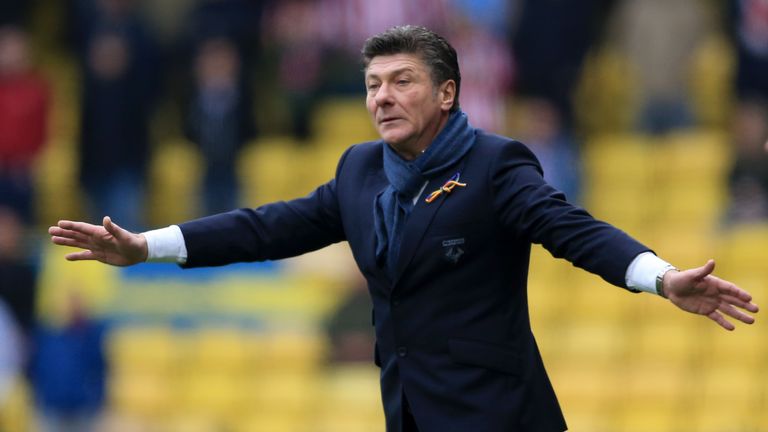
Watford manager Walter Mazzarri wore a rainbow laces
lapel badge during his side's clash against Stoke on Sunday
Creativity of communication made the campaign go further
At Brentford v Birmingham on Saturday, boots with rainbow laces graced the front cover of Bees Review.
Inside, the programme editorial not only stressed that "homophobia is
unacceptable" but also promoted the club's nascent lesbian, gay, bi and
trans supporters group, LGBeeT. One of their members told Sky Sports
on Saturday: "Seeing the programme cover actually brought a tear to my
eye. We've had fans come to us in the past and say they haven't been to
Griffin Park for a long time because they don't feel they can be
themselves in such an environment. More than ever, we can show them that
times are changing."
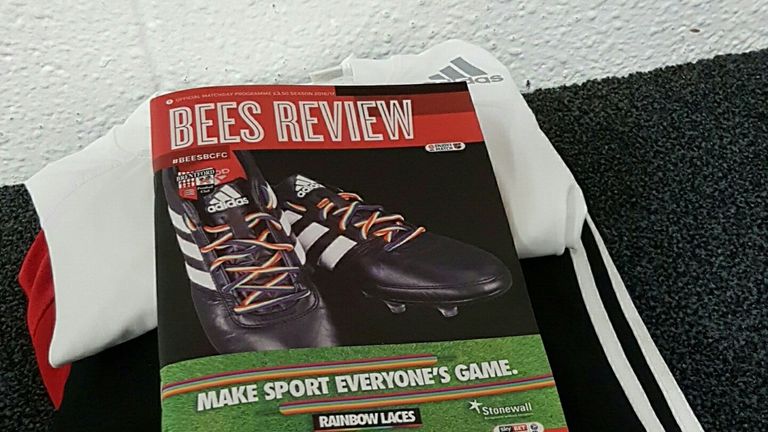
The Brentford matchday programme Bees Review featured Rainbow Laces on its front cover on Saturday
Rainbows
abounded - in the Premier League, flags were flown and 20 captains wore
special armbands; on social media, profile pictures were filtered with
all the colours; EA Sports made a bespoke kit available on FIFA Ultimate
Team; and the national stadium's arch became a Wembley spectrum. The
actual laces themselves aren't universally popular with players (the
standard issue are considered by some to be too chunky for modern boots,
and footballers are creatures of habit when it comes to matchdays) -
but even then, many wore them for at least the warm-up. Crucially, the
campaign wasn't tied down to its basic element; and helping it to break
free were not just LGBT people, but their fellow fan allies too.
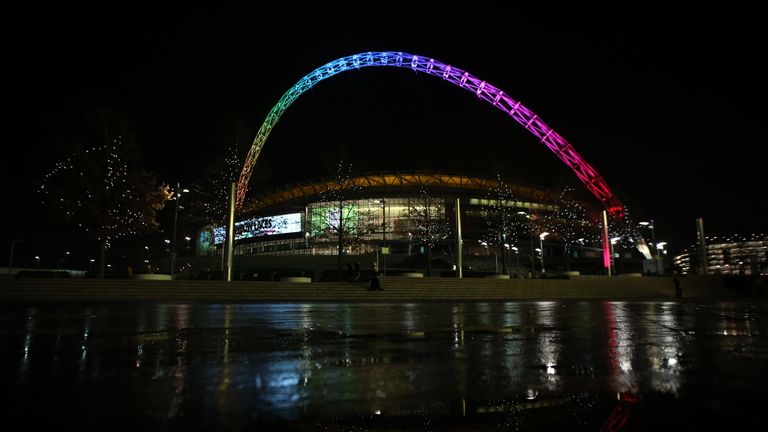
The Wembley Stadium arch was lit up in rainbow colours on Saturday night
People can feel they can call out and challenge homophobia in sport with confidence
For
football, a fear of even talking about a subject long considered taboo
has blocked significant progress for many years. But with wider society
now well versed in the conversation, it was high time to put it on the
agenda - and nowhere was that more apparent than social media. At the
time of writing, the Premier League's lion on rainbow profile pic change
has attracted 191,000 reactions, 88% of them 'likes' or 'loves'. Brave
the comments section, and you'll quickly spot negative and outright
homophobic views - but also countless replies from fellow fans
vehemently providing the counter argument. There will always be 'a small
but vocal minority' who won't accept LGBT people in sport - Stonewall
states that in its campaign literature - but those voices are being
drowned out, strongly suggesting that standing up to homophobia is now
the norm. With the vast worldwide reach of the Premier League as it is,
and the visibility this weekend so great, the message couldn't be shut
out this time - on advertising hoardings, syndicated broadcasts, in
social timelines and in arguably the most substantial examples, from the
mouths of players themselves.
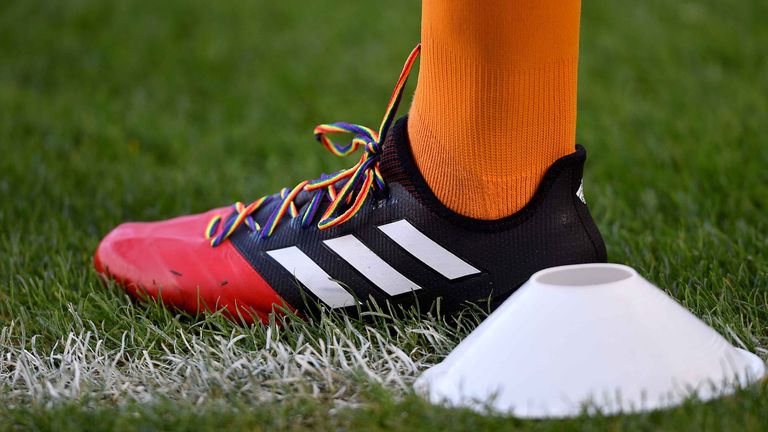
Many players wore rainbow laces in the warm-up, even if
some swapped them out for their regular laces for the match itself
Give players the chance to use their power for positive change
A
respected England international with over 100 caps fronting the video
should be enough for any sports campaign but alas, the lack of gender
equality in football doesn't allow Casey Stoney to be so influential.
She has a lot to be proud about - captaining her country, being a mum of
two and for being herself in sport, which just happens to be an out
lesbian player. Also a Living for Sport ambassador and broadcaster for
Sky Sports (she was watching Arsenal v Bournemouth for SSN HQ on
Sunday), Stoney is a true role model for boys and girls. In the men's
game, Hull's Curtis Davies and Brighton's Liam Rosenior
were both handed the chance by Sky Sports to discuss homophobia last
week; they did so with eloquence and sincerity. Meanwhile, on the FA's
website, the organisation posted a video interview with Coventry's Chris Stokes,
who was banned and fined for using homophobic language on Twitter at
the end of last season. After describing the merits of the FA education
course he was sent on as part of his punishment, Stokes adds: "If
someone's going to come out, they need support from the whole football
environment." To really drive the message home, the players who fans
idolise need to be heard as part of that support network.
'Diversity is the one true thing we have in common. We should celebrate it.'
You
may have seen the above quote before - it's been attributed by some to
Winston Churchill, although its origins remain unclear. What can't be
questioned is that diversity was truly celebrated in sport last weekend,
even though not everyone chose to come to the party. So what next? For
LGBT people and allies in sport, it's time to reach out to those whom
the message didn't reach - many football clubs around the country,
including several in the EFL, didn't follow the rainbow road, and it's
important to listen to their reasons why. Much of that dialogue needs to
be with the supporters of those clubs - fan organisations like Pride In Football and the GFSN (Gay Football Supporters' Network)
can help facilitate that. In previous years, the majority of clubs have
focused their support for LGBT inclusion with a designated 'Football v Homophobia' home game during the month of February, while running throughout the season is Kick It Out's Call Full Time On Hate
initiative, combatting all discrimination. Communicating a strategy of
action to the fanbase is the best way of clarifying positions.
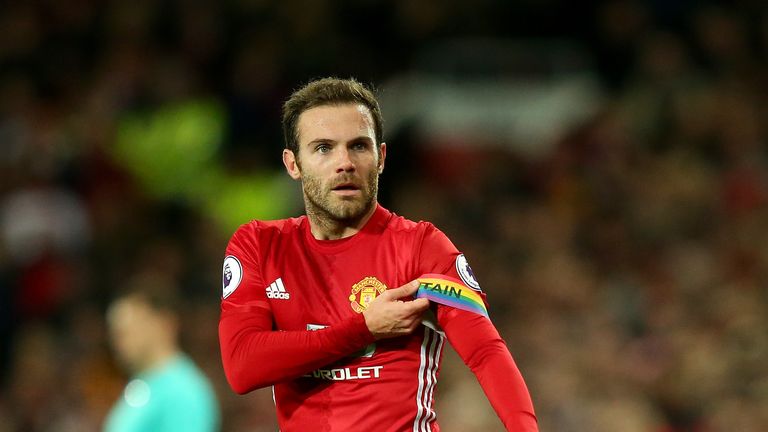
Juan Mata took the rainbow captain's armband from his
Manchester United team-mate Wayne Rooney against West Ham on Sunday
With the LGBT cause having
benefitted from a spell in the spotlight, it's vital that other
diversity groups are given a chance to shine too. Within the last month,
the Sports People's Think Tank have flagged the lack of progress in BAME coaching representation; disabled fans have voiced their dissatisfaction with clubs over access; and sexism continues to hinder gender equality at all levels. Where these causes intersect (for example, sexism's impact on homophobia was explored in Sky's Sportswomen programme last week), there is an added incentive for groups to work together and call for action.
We'll leave the last word to Robbie Rogers,
still the only out gay male professional player in world football.
Revisiting his interview with Geoff Shreeves from February 2013, it's
apparent that three-and-a-half years on, homophobia is still stopping
LGBT people from being themselves in sport. But Rogers was optimistic
about the future then, stating: "After this whole process, I've had so
much support that I think it's about setting an example for people."
Never before in the British game has that example been set so
prominently by so many, and while there can be no room for
complacency, football can reflect with pride on a result of great
significance.
- Get link
- X
- Other Apps